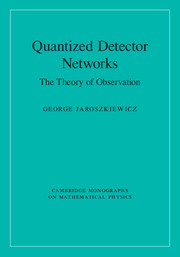Book contents
- Frontmatter
- Contents
- Preface
- Acronyms
- 1 Introduction
- 2 Questions and Answers
- 3 Classical Bits
- 4 Quantum Bits
- 5 Classical and Quantum Registers
- 6 Classical Register Mechanics
- 7 Quantum Register Dynamics
- 8 Partial Observations
- 9 Mixed States and POVMs
- 10 Double-Slit Experiments
- 11 Modules
- 12 Computerization and Computer Algebra
- 13 Interferometers
- 14 Quantum Eraser Experiments
- 15 Particle Decays
- 16 Nonlocality
- 17 Bell Inequalities
- 18 Change and Persistence
- 19 Temporal Correlations
- 20 The Franson Experiment
- 21 Self-intervening Networks
- 22 Separability and Entanglement
- 23 Causal Sets
- 24 Oscillators
- 25 Dynamical Theory of Observation
- 26 Conclusions
- Appendix
- References
- Index
14 - Quantum Eraser Experiments
Published online by Cambridge University Press: 24 November 2017
- Frontmatter
- Contents
- Preface
- Acronyms
- 1 Introduction
- 2 Questions and Answers
- 3 Classical Bits
- 4 Quantum Bits
- 5 Classical and Quantum Registers
- 6 Classical Register Mechanics
- 7 Quantum Register Dynamics
- 8 Partial Observations
- 9 Mixed States and POVMs
- 10 Double-Slit Experiments
- 11 Modules
- 12 Computerization and Computer Algebra
- 13 Interferometers
- 14 Quantum Eraser Experiments
- 15 Particle Decays
- 16 Nonlocality
- 17 Bell Inequalities
- 18 Change and Persistence
- 19 Temporal Correlations
- 20 The Franson Experiment
- 21 Self-intervening Networks
- 22 Separability and Entanglement
- 23 Causal Sets
- 24 Oscillators
- 25 Dynamical Theory of Observation
- 26 Conclusions
- Appendix
- References
- Index
Summary
Introduction
In recent years, numerous quantum optics experiments have demonstrated novel quantum effects based on quantum amplitude superposition. Some of these empirical observations raise disturbing questions about the nature of reality, particularly concerning quantum nonlocality. In this chapter we discuss some experiments that suggest (to us, at least) that the information void, that uncharted regime between signal preparation and outcome detection, is not well modeled by classical spacetime. Something strange seems to be lurking there.
For the purposes of exposition, the sequence of experiments we discuss in this chapter does not follow the historical sequence of those experiments, We discuss first the delayed-choice quantum eraser experiment of Kim et al. (Kim et al., 2000), referred to here as KIM. This leads us to define a heuristic measure of which-path information that is central to the theme of this chapter. This leads to a discussion of Wheeler's thought experiments on the conundrum of delayed choice in physics, particularly evident in the phenomenon of galactic lensing (Wheeler, 1983), and its empirical implementation, the delayed-choice interferometer experiment of Jacques et al., referred to as JACQUES. Our final experiment in this sequence is the double-slit quantum eraser of Walborn et al. (Walborn et al., 2002), referred to as WALBORN. That experiment gives a significant challenge for quantized detector networks (QDN) to reproduce its empirical results.
Such experiments have led to suggestions that interference patterns formed by particles impacting on a screen may be influenced in some way by decisions made long after those particles had landed on that screen. Our objective in this chapter is to show by a detailed QDN analysis of those experiments that quantum principles do not support these suggestions. Nevertheless, something bizarre seems to be there.
There are two complementary aspects in these experiments that have deeply worried physicists. The first involves spatial nonlocality and is the point of Wheeler's concerns. Historically, it has been a great source of debate among physicists.
- Type
- Chapter
- Information
- Quantized Detector NetworksThe Theory of Observation, pp. 179 - 197Publisher: Cambridge University PressPrint publication year: 2017



